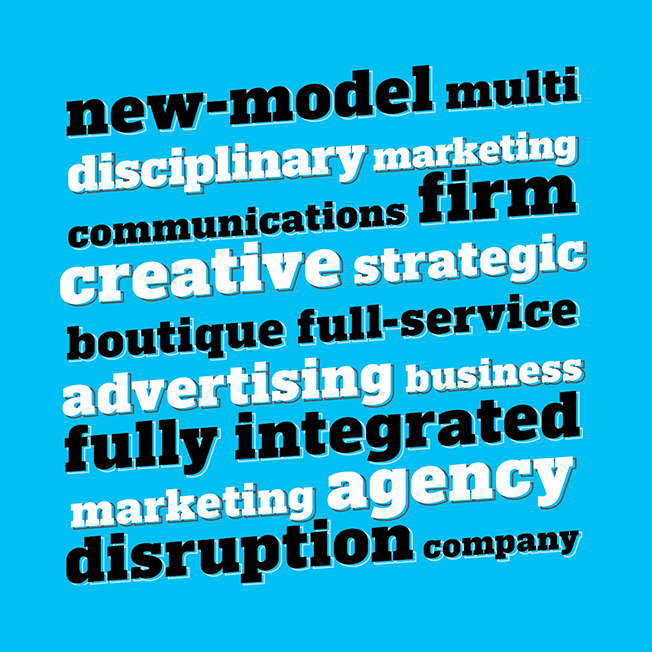New-model, multidisciplinary marketing communications firm; creative and strategic boutique; full-service advertising business; fully integrated marketing agency; the disruption company.
Do these bursts of jargon sound familiar?
PepsiCo marketing executive Brad Jakeman earned attention during October's ANA Masters of Marketing Conference for suggesting—among other things—that marketers need to do away with such "dated" terms as "digital marketing" and "advertising agency." Based on the descriptions offered by the agencies themselves, many advertising execs agree with him, given that agencies now are in the business of content creation, product innovation, marketing and communications.
But this is not a new conversation. "We debated whether we wanted to be 'agents' for other people," noted Steve Red, on co-founding Philadelphia's Red Tettemer O'Connell + Partners 20 years ago. "Was the word 'advertising' too limiting?"
RTO+P now calls itself "a full-service ad agency that makes brands unforgettable," and Red attributed the current debate over nomenclature to "agencies breaking out of the model that they've traditionally been known for."

To use another white-hot marketing term, it's disruption in action.
"Agencies let ourselves get put into the box, and it's up to us to prove that we are more than just that," said J.B. Raftus, CMO of Austin-based GSD&M. "In 1971 our founders literally didn't know what an advertising agency was. They just knew they were creative thinkers who could help solve business problems. Even when they became categorized as an agency, they rebelled against it."
The Variable in Winston-Salem, N.C., once described itself as "a digitally informed marketing lab." But it didn't stick.
"We were tired of the model and tried to call ourselves something other than an agency," explained co-founder Joe Parrish. This effort, however, proved to be a challenge on the business side—so he and his partners settled on the phrase "reformed ad agency."
Meanwhile, R/GA, which launched in 1977 as R/Greenberg Associates, developed a reputation over time as a formidable digital shop and became identified as such. Today, the agency prefers to be called a company "for the connected age."
"The new descriptors are interesting," R/GA marketing chief Daniel Diez said of the monikers adopted by agencies. "If I were a client, the most important factor would be, 'What kind of work are you doing?' [It's about] demonstrating what products and services are good for, rather than us putting up window dressing. The work does more than any descriptor or qualifier could do."
"Saying you're something only goes so far," RTO+P co-founder Red added. He told Adweek that some of the blame for this conundrum lies with clients, which need to start "thinking beyond agencies, consultants and the same group they constantly invite into pitches" and begin "busting perceptions on the client side instead of talking about what agencies should call themselves."
Parrish said that agencies tinkering with their monikers "want to be the jack of all trades" in order to keep up with a rapidly shifting conversation. But he also thinks that conversation will reach something approaching consensus in coming years: "Agencies will say that they are 'fully integrated communications companies.'"
Parrish told Adweek that the contentious ANA presentation by PepsiCo's Jakeman raised some valid, if familiar, concerns. He said, "I know Jakeman's taken a lot of heat, but I like people who will at least start a conversation."
Diez agrees with Jakeman on another major theme: "We will see a point when 'digital agency' is a description that doesn't feel right anymore because it will be assumed that, if you are an agency in existence, you do this," he said.
These changes come at an interesting time following the end of AMC's Mad Men, which heightened awareness of the industry and indirectly emphasized the stark difference between the 1960s and today's more descriptively cluttered agency landscape. The show "raised the romantic notion of what agencies are," noted RTO+P's Red.
Diez added, "Mad Men made people nostalgic for a time when a beautiful piece of advertising in a single channel could grab the attention of the country and cause a huge number of people to change their behavior."
This sort of influence is still possible, but today's "aha" moments are far more complex—as are terms used to describe the sweaty, imperfect process that precedes them.








